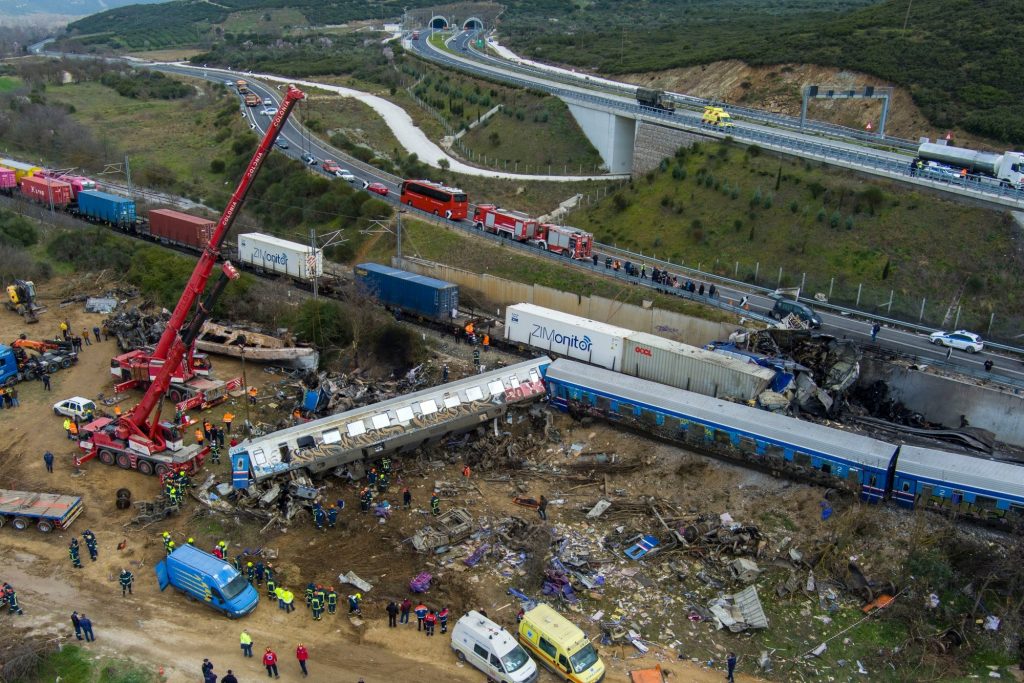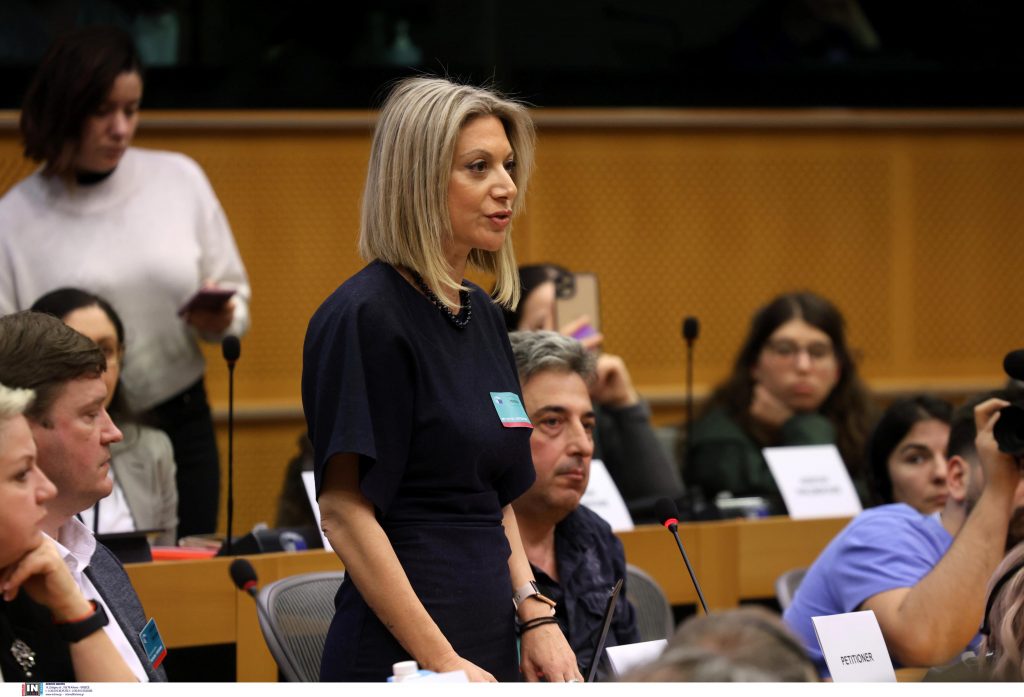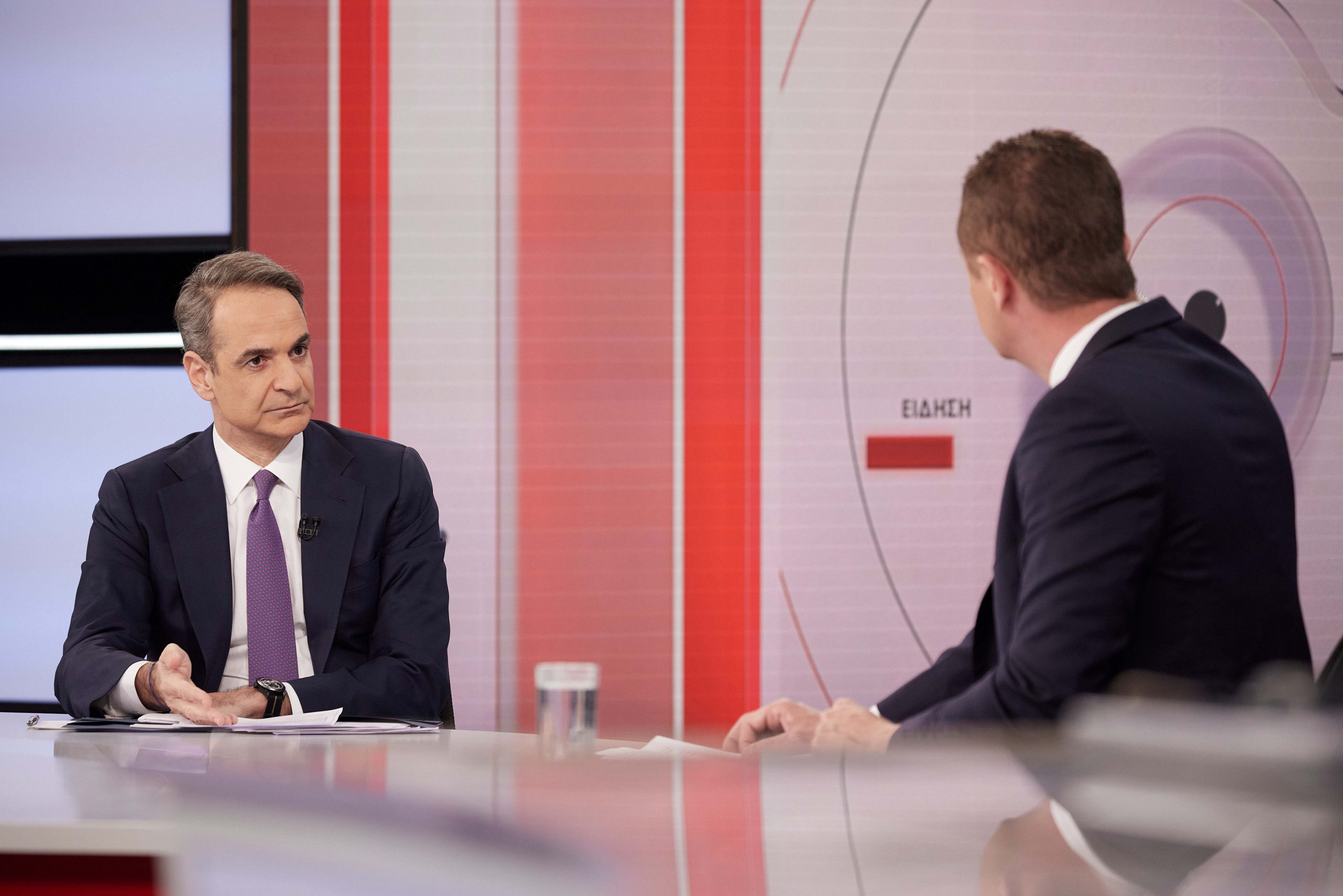Greek Prime Minister Kyriakos Mitsotakis left open the possibility that the ill-fated freight train at Tempi carried a “suspicious” cargo when it collided head-on with a passenger train in late February 2023, speaking during a live interview on Wednesday evening. In a reversal of a previously categorical rejection, Mitsotakis acknowledged that “the then unlikely scenario regarding the cargo may now be possible.”
The collision called the Tempi disaster after the same-name gorge in north-central Greece near where it occurred, is Greece’s deadliest rail accident ever. The collision claimed 57 victims, a good portion of which were university students returning to the northern city of Thessaloniki.
Mitsotakis’ appearance on the Alpha channel’s prime-time newscast came days after large protest rallies took place around Greece, with the main theme being a demand for swift justice and culpability to be assigned for the deadly accident. The biggest rally took place in central Athens’ Syntagma Square, in front of Parliament, and was reminiscent of the anti-bailout and anti-austerity “indignados” rallies of more than a decade ago.
“I believe that Greek society continues to experience the Tempi (disaster) as an open wound, as a collective trauma; as collective mourning, and I believe that the citizens (at the protests) all over Greece and abroad – which I think included people who also support our (ruling) party – were asking for three things: to find out the truth, exactly what has happened; to achieve justice and punish the guilty parties; and thirdly, to ensure that something like this never happens again and that Greece has modern, safe and reliable European trains.”
Mitsotakis’ reference to “suspicious cargo” on the Tempi train emanates from hitch-pitch questioning by political rivals, continued media scrutiny, and assertions by many relatives of Tempi victims that an explosion during the two-train crash – as seen on grainy nighttime video – is not due to the powerful collision but is the result of highly flammable liquid carried on the freight train igniting. Trace elements of xylene detected in the debris gave rise to assertions of a large shipment of solvents being illegally transported from Thessaloniki to an unknown destination in southern Greece. Such solvents are often used to adulterate petrol products, thereby swindling motorists at the gas pump, part of a long-standing fuel smuggling scourge in the east Mediterranean country.
Reports that many of the victims in the front two carriages of the passenger train died from asphyxiation or were burned to death by the explosion that took place on the freight train, according to the reasoning, have generated a sharp backlash against the center-right government over an alleged “cover-up” and “foot-dragging” by the independent judiciary overseeing the ongoing investigation and forthcoming trials. The criticism has continued unabated even after Mitsotakis’ center-right New Democracy (ND) convincingly won a general election three and a half months after the tragedy.
According to initial findings, a single station master’s mistake to keep the north-bound passenger train on the south-bound track – and in the path of the oncoming south-bound freight train – caused the collision at the southern mouth of the Tempi Gorge – and only a short distance from a rail tunnel. Intense media and law enforcement scrutiny at the time focused on whether he met specific criteria for the position, if he was properly trained and whether his more experienced colleagues at the Larissa rail station had left their shifts earlier than prescribed. On a broader front, sharp criticism and scrutiny centers on why fail-safe and back-up security systems – both manual and electronic – were not in place to prevent and correct human error, an issue that touches all Greek governments, transport ministry leadership and the management of state-run Hellenic Railways Organization (OSE) over the past two decades or so.
A separate EU probe had commenced on why the Greek state had failed to implement a contract – No. 717 – that would have installed and operated a remote monitoring system on the specific railroad stretch.
The northbound train was shifted to the southbound track in order to bypass a section of the northbound track that was left without power, reportedly due to ubiquitous “metal scavengers” stealing crucial equipment, such as copper cables. The rerouting was to be temporary, but the passenger train remained on the southbound track.
Asked by the newscast’s anchor over the serious allegation, including by many of the Tempi victims’ families, of a cover-up, Mitsotakis said no such decisions were taken to conceal any evidence, while he said the political opposition in the country was “exploiting the pain of people who have lost their children. If mistakes were made, the prosecutor’s office will decide.”
At the same time, Mitsotakis appeared ready to consider the possibility of an illegal cargo aboard the freight train, essentially “walking back” from a statement in the immediate wake of the accident, namely, that no hazardous materials or cargo were aboard the freight train – a prospect that would have entailed transport in multiple metal containers or possibly barrels, as the latter was not hooked up with a tanker carriage.

“There were people who died on the train not as a result of the collision. There isn’t just one (accident) report, there are two. There are many people that will draw conclusions and help us to get to the truth. I am not a scientist; I’m not a chemist and I am not the one who will be able to form an opinion on this matter. But I know is that I, too, want to know the truth.”
In an indirect response to other very vocal criticism that a tract of land adjacent (west side of the tracks) to the crash site was covered over with gravel, ostensibly to facilitate salvage efforts, and is, therefore, part of a cover-up, similar to the misplacing of at least one carriage by clean-up crews, Mitsotakis replied:
“…who could I possibly cover for? For some potential smugglers?”, he asked, while dismissing the notion that “…the country’s prime minister, at the moment he went to the scene of the accident and saw these tragic images, which I will never forget, and when our only concern at that time was first to save the injured and then immediately afterwards…to be able to identify and return the bodies, or what was left of the bodies to the relatives, was concerned with achieving some kind of cover-up.”
“Let me repeat that the final say in all of this is the appellate-level investigator, he is the only one who, today, has the full picture of all the investigative material,” Mitsotakis said, while he earlier reiterated that the sole responsible party for the cargo being transported on the freight train is its operator, private Hellenic Train, who also operated the passenger train.
“I have the fire brigade’s report, the first report. I also have here, foremostly, the response by Hellenic Train. If it turns out in the end that this (freight) train is not above doubt, then Hellenic Train, which is responsible, will have to answer and be held accountable, both in a criminal court – which obviously is not my responsibility – but also politically. Because it was Hellenic Train that gave assurances, not to me, but to Parliament, and I recall the statement made two weeks after the accident…”
Query over then transport minister Costas A. Karamanlis
Asked if he should have included the then transport minister, Costas A. Karamanlis, in ND’s ballot for the subsequent general election, Mitsotakis said that the latter’s election as a deputy representing the Serres constituency does not affect the ongoing criminal investigation. Karamanlis, the namesake and first cousin of two-time prime minister Costas Karamanlis, resigned as minister shortly after the Tempi disaster but not as a Parliament deputy. He was re-elected a few months later.
“The (judicial) investigation is drawing to a close. When the investigating magistrate and the prosecutor decide to send the case file to Parliament, because they consider that there is criminal involvement of political figures, then the government majority will not stand in the way,” he said, while adding that the overall judgment will emanate from judiciary and that ND revised the constitution so that there is no statute of limitations on such cases.
“It’s outrageous to accuse this party of seeking a cover-up,” he said.
‘I will never blame a parent who has lost a child in an accident where there’s state responsibility’
In response to the vigorous and vocal reactions and activity by many of the victims’ families to keep the case in the public limelight in Greece and Europe, and to demand swift justice, Mitsotakis made clear his opposition with any criticism aired at the former.
“Ms. Karystianou lost her child. I am putting an end to this (criticism) and others should do the same. If there are political parties that instrumentalize this anger, then that’s another matter. This is going on, and we (ND party) could have done the same for Mati, where 102 people were burned alive,” he said, in first mentioning Maria Karystianou, the most prominent and outspoken representative of parents who lost children in the Tempi rail disaster. Karystianou’s daughter, Marthi Psaropoulou, was among the 57 victims of the rail collision.

File photo: Maria Karystianou appears before a European Parliament committee.
The reference to Mati relates to a deadly wildfire that engulfed the same-name holiday home settlement on the eastern Attica coast in late July 2018.
The then leftist Tsipras government, with the rightist-populist ANEL party as its junior coalition partner, was vilified at the time for the failure of emergency responders to combat with the fast-moving wildfire, or to order an immediate evacuation or even field a substantive rescue operation, as many of the survivors of the flames had to jump off hillsides into the sea to escape.
“We chose not to do that. We’re not all the same. You will never hear something from me about any (grieving) parent… I will never blame a parent who has lost a child in an accident where there is also state responsibility.”



